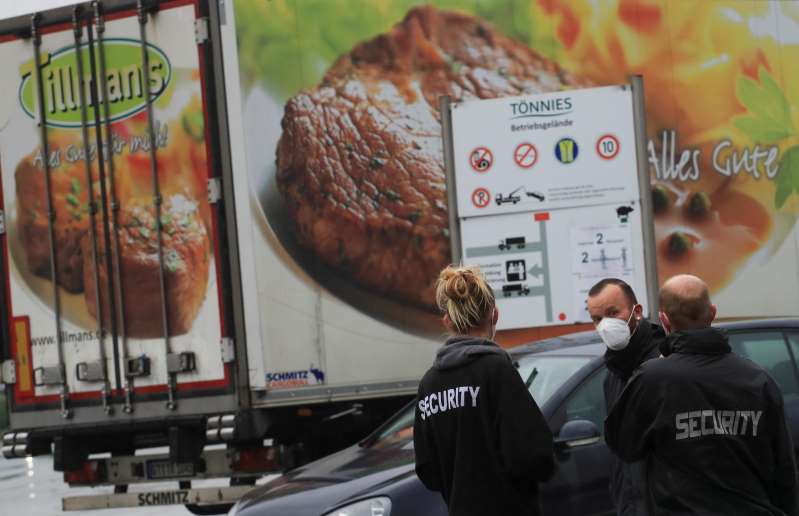Politics banned work contracts, now industry giants like Tönnies and Westfleisch are reacting

In the German meat industry, the law for better working conditions that has been in force since the beginning of the year has significantly increased the number of permanent positions in the industry, according to the dpa news agency. The large slaughterhouses have significantly increased their permanent staff.
Across Germany, at the North Rhine-Westphalian companies Tönnies (Rheda-Wiedenbrück) and Westfleisch (Münster) as well as at Vion Germany in Buchloe, Bavaria, a total of around 12,300 workers have switched to the corporate workforce as employees of subcontractors, according to the spokesmen for the companies of the German Press Agency ( dpa) announced .
Tönnies, Westfleisch and Vion had already announced corresponding programs in the course of the corona pandemic in the summer. After numerous infections in the workforce, the meat industry came under pressure in the spring. In particular, the high number of manual workers from Eastern Europe, some of whom were housed in shared accommodation, had triggered criticism. Some of the slaughterhouses were closed for weeks in order to break the chains of infection. At the beginning of the year (January 2nd) the newspaper Neues Deutschland reported on the completion of the new hires.
On January 1, 2021, the German government changed the law to prohibit the use of manual workers in the slaughterhouse's core business in the area of slaughtering and cutting. From April 1st, there will be a ban on the use of temporary workers, even with restrictions. Craft businesses with fewer than 50 employees are excluded.
Thousands of employees
According to his own statement, market leader Tönnies comes with an additional 6,000 to 12,500 permanent employees in Germany. At the headquarters in Rheda-Wiedenbrück, 3,500 former workers are now part of the permanent workforce. In 2019, Tönnies achieved sales of meat products of 7.3 billion euros.
Westfleisch, based in Münster, had already announced in June that it would hire all employees directly. After integrating around 3,000 factory workers on January 1, 2021, the total number of employees is around 7,000. Westfleisch turned over almost 2.8 billion euros in 2019.
The Vion Group, which is headquartered in the Netherlands, hired around 3,300 subcontractors at 16 locations in Germany at the turn of the year in addition to the previous workforce of 3,000. In 2019, Vion had a worldwide turnover of 5.1 billion euros from the slaughter of pigs and cattle.
“With the law that has been in force since January 1st, we do not have the impression that it is a matter of cosmetics,” said Johannes Specht from the food and beverage trade union of the dpa . “If the industry has not now understood that something has to change, then there is no help. And change then means: fair work, with compliance with the law and with collective agreements,” says Specht.
The NRW Ministry of Labor points out that customs as the federal authority are responsible for the controls on the ban on work contracts. As part of the cooperation, the occupational health and safety administration will pass on any violations it has become aware of to the customs authorities, a spokesman said.
“On the subject of a comprehensive collective bargaining agreement, for which Mr Tönnies has spoken out: We are open to negotiations,” says the head of the NGG collective bargaining department. So far, however, the union has not received an answer from Tönnies or the meat associations.
Tönnies, however, refers to the competence of the association. “In the course of the legislative process, the Association of the Food Industry asked the NGG to discuss collective agreements. Only when the legislative process was completed did the NGG approach the association in December,” said a company spokesman. The first exploratory talks between the socio-political committee of the German meat industry, in which Tönnies and its competitors are also represented, and the NGG should start soon, according to Tönnies.
temporary work
The legislature in Germany prohibits the use of temporary work from April 1st. The meat industry refers to the barbecue season in summer. Specht also calls on employers to hold talks here. “In other economic sectors, which also have seasonal fluctuations, there are very flexible working time models. Chocolate bunnies or beer are not produced to the same extent all year round,” says Specht. It is in the nature of things that there is more work to be done during this time. “But that's exactly why there are working time accounts. And that works too,” says the union representative.
There were positive reactions from the SPD parliamentary group. “Without our law nothing would have moved in the meat industry. The entire industry would be well advised to implement the new law quickly and to face reality. The way the meat industry has behaved in recent years would be humble,” said the deputy group leader Katja Mast. “It was right that we did not give in. Something finally happened,” said her group colleague Elvan Korkmaz-Emre.

